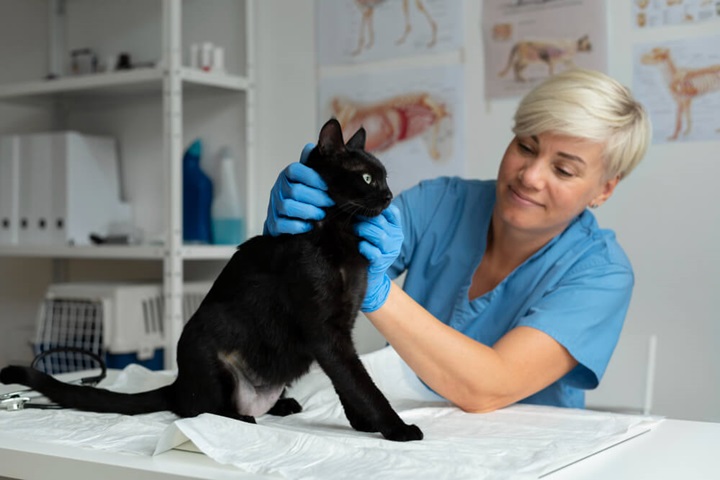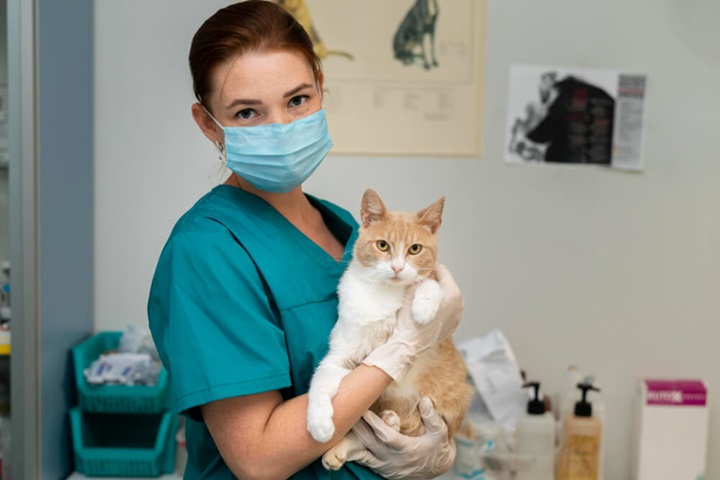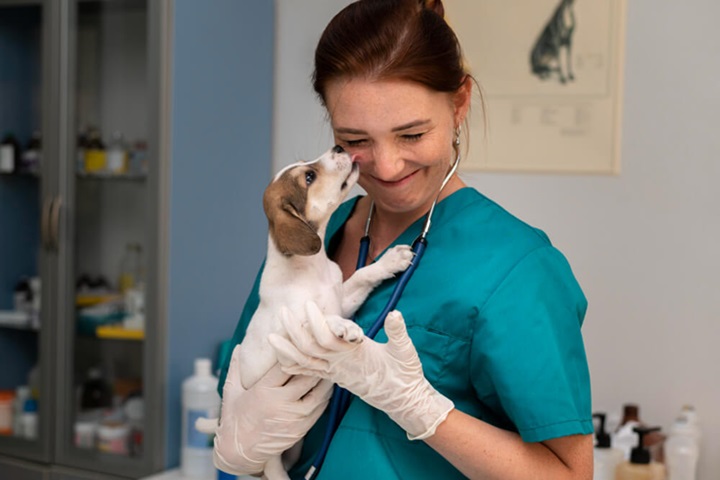Do you have a passion for working with animals? Becoming a veterinary nurse might be the right career option for you! Find out about our veterinary nurse courses in this article.
Embarking on a career as a veterinary nurse is both fulfilling and dynamic, offering a unique blend of medical expertise and compassionate animal care. In this article, we will guide you through the essential steps to become a veterinary nurse, from acquiring the necessary qualifications and gaining invaluable work experience to understanding the daily responsibilities of the role. Even if you are on the fence about partaking in an online veterinary nurse course to become a vet nurse, this article will aid in steering you in the right direction.
We have more interesting guides about animals, including our updated guide on the best dog breeds of 2024 for those passionate about our canine friends!
What is Veterinary Nursing?
Veterinary nursing is an integral part of animal healthcare, focused on the supportive care of animals under treatment and recovery in veterinary practices. If you’re wondering how to become a veterinary nurse, it starts with understanding this critical role.
A veterinary nurse collaborates closely with veterinarians to provide medical care, making a significant impact on animal health and welfare. They are instrumental in performing diagnostic tests, administering treatments, and managing recovery processes.
Each nurse needs their respective colour. Read the meanings behind every nurse uniform colour codes in our informative article.
Duties of a Veterinary Nurse

The day-to-day responsibilities of a veterinary nurse are diverse and vital to the effective operation of veterinary clinics. Key duties include:
- Preoperative Preparation: Ensuring animals are ready for surgery, including administering pre-surgical treatments and radiographies.
- Post-operative Care: Supporting both animals and their owners post-surgery, providing necessary medication and care instructions, including the application of bandages to fractures and wounds.
- Diagnostic Support: Conducting essential tests in the practice’s lab, such as blood and urine analysis, which are crucial for diagnosing various conditions.
- Education and Advice: A significant part of a veterinary nurse’s job is to educate pet owners on optimal animal care and nutrition, enhancing the welfare of the pets.
Explore our range of online animal courses uk today and take the first step towards a rewarding career with animals. Enrol now!
How To Become A Veterinary Nurse: Options Available

If you’re considering a veterinary nurse course, you have several pathways to choose from. The two primary routes are through vocational training or academic study in higher education. To begin, ensure your chosen course is accredited by the Royal College of Veterinary Surgeons (RCVS), as this is crucial for eligibility to practise. At NCC, we offer our own veterinary assistant course.
Work Experience
If you’re wondering how to become a veterinary nurse, gaining relevant work experience is a critical step. This not only aids your application to veterinary nurse courses but also ensures you have a genuine interest and aptitude for the field. Engaging in various settings such as veterinary clinics, animal shelters, and farms enriches your understanding and skills, making you a strong candidate for formal training, further highlighting that you are passionate for the role.
To thrive as a veterinary nurse, it’s beneficial to seek experience beyond typical veterinary practices. Consider volunteering at local kennels, catteries, or even wildlife rehabilitation centres to establish your volunteer skills. Each environment offers unique learning opportunities and exposure to different aspects of animal care, providing a well-rounded experience. By familiarising yourself in these environments will help you to decide which sector is right for you.
Here are some institutions that offer volunteer work for veterinary nurse experience:
Is a Career in Veterinary Nursing Right for You?

Deciding whether to pursue a career in veterinary nursing involves careful consideration of both the role’s demands and its rewards. Veterinary nurses need a strong commitment to animal care, resilience to handle medical tasks, and the ability to communicate effectively with pet owners. The job involves long hours and can be physically demanding but offers immense satisfaction through direct impact on animal health and welfare.
After all, a career in veterinary nursing is not only about medical care; it’s about forming lasting bonds with animals and their families, educating the public on pet health, and continuously learning and adapting to new challenges. If you have a passion for animal care and the dedication to complete the necessary educational steps, veterinary nursing can be a highly rewarding career choice.
Still not convinced? Here are more reasons to pursue a career in the veterinary industry.
FAQs
How long does it take to become a veterinary nurse?
It typically takes two to three years to become a qualified veterinary nurse. This involves completing a vocational qualification, such as a Level 3 Diploma in Veterinary Nursing, which combines practical work experience in a veterinary practice with study.
How do I become a vet nurse without going to university?
To become a vet nurse without attending university, you can pursue vocational training routes. Enrol in a Level 3 Diploma in Veterinary Nursing, which is offered by various colleges and includes a significant amount of practical, hands-on training in a veterinary practice. This route allows you to work and learn simultaneously, leading to qualification without a university degree.
How do I get work experience in veterinary nursing?
To gain work experience in veterinary nursing, start by contacting local veterinary practices, animal shelters, or farms to inquire about volunteer opportunities or shadowing experiences. It’s also beneficial to apply for formal work placements through educational programs that require practical experience as part of their curriculum.
What can volunteers do at a vet practice?
Volunteers at a vet practice can assist with a variety of tasks, including managing reception areas, helping with animal care under supervision, cleaning and preparing equipment, and observing medical procedures. Their specific roles often depend on the practice’s needs and the volunteer’s level of experience.
Sources
Royal College of Veterinary Surgeons. (2011) Home. [online] Available at: https://www.rcvs.org.uk/home/ [accessed 05/06/2024]
WVS: Worldwide Veterinary Service. (2009) Volunteer. [online] Available at: https://wvs.org.uk/volunteer/ [accessed 05/06/2024]
RSPCA. (2009) Be A RSPCA Animal Care Volunteer. [online] Available at: https://www.rspca.org.uk/getinvolved/volunteer/whatcanido/animalcare [accessed 05/06/2024]
PDSA. (n.d.) Volunteering in our Pet Hospitals. [online] Available at: https://www.pdsa.org.uk/get-involved/volunteer/volunteering-in-our-pet-hospitals [accessed 05/06/2024]
Vet Nursing (2023) Top 7 Reasons to Pursue a Career in the Veterinary Industry. Applied Vocational Training. [online] Available at: https://www.appvoc.com/career-working-with-animals/ [accessed 05/06/2024]








